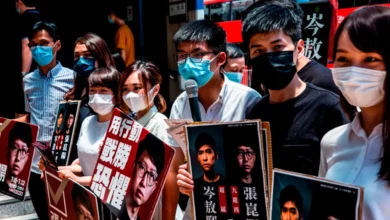Paris–US Secretary of State Hillary Rodham Clinton arrived to Cairo on Tuesday to press transitional leaders to follow through on pledges for democratic reform after the ouster of the country's longtime autocratic president in a popular revolt.
Clinton is the first Cabinet-level Obama administration official to visit Egypt since the uprising that toppled Hosni Mubarak. Her visit comes amid rising concerns in the US that anti-government rebellions sweeping the Middle East may not usher in the kind of political changes and freedom that people are protesting for.
She is particularly keen to ensure that Egypt's new leaders follow through on meeting the aspirations of the demonstrators and, in particular, ensure respect for human rights. She is scheduled to have a working dinner and a news conference in Cairo with Nabil al-Arabi, Egypt's newly appointed foreign minister.
Later in Cairo, Clinton will speak with activists to encourage them to continue to make their voices heard but also to be patient as the transitions pick up steam.
On Wednesday, she'll move on to Tunisia, where the wave of rebellion now gripping the Arab world began in December.
On her last Mideast trip — in January, as unrest gripped Tunisia — Clinton delivered a stark warning to Arab governments that they risked "sinking into the sand" if they did not address the demands of their people. A day later, Tunisian President Zine El Abidine Ben Ali fled into exile, emboldening protesters in other nations.
The Obama administration is also wrestling with increased calls for military intervention in Libya. Clinton on Monday held a late-night meeting with a senior Libyan opposition figure, but the US remains undecided about exactly how much support to lend a group it knows little about.
Meanwhile, French President Nicolas Sarkozy and British Prime Minister David Cameron stepped up calls for world powers to isolate Libyan leader Moammar Gadhafi with a no-fly zone.
Anti-government demonstrations in Bahrain grew more heated Monday, as a military force from Saudi Arabia and other Gulf nations moved in to shore up its Sunni Muslim rulers in the face of escalating Shia-led protests.




